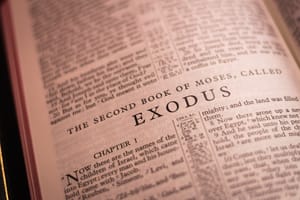From time to time I’ll issue an invitation to our church members. I’ll ask them to let me know privately whether there’s any Bible passage that they’ve read recently, found puzzling, and would like to hear explained. If they do, I may set aside a Sunday sermon or a midweek Bible-study to tackle the passage. If one person has had such difficulties with a passage, it’s likely that others have too and would welcome an explanation.
When I look back over the passages people have asked for, it’s noticeable that a large proportion of them are Old Testament narrative passages. It seems that there are many stories told in the Old Testament which leave people baffled, not because readers find it hard to understand what the individual sentences mean, nor because the events seem harsh or morally difficult, but at a more basic level. They leave readers asking, ‘Just what is this all about? What on earth is going on here?’
I’ll give you an example, one that I’ve been asked about several times. I’m thinking of Exodus 4:20-26. Here it is, v. 20: ‘...Moses took his wife and his sons and had them ride on a donkey, and went back to the land of Egypt...’; vv. 24-26 ‘...at a lodging place on the way the LORD met him and sought to put him to death. Then Zipporah took a flint and cut off her son’s foreskin and touched Moses’ feet with it and said, “Surely you are a bridegroom of blood to me!” So he let him alone. It was then that she said, “A bridegroom of blood,” because of the circumcision.’
I’ve included verse 20 for context, but that’s not where people struggle. It’s the three verses at the end of the passage (verses 24 to 26) that really cause bewilderment. And it’s not just the members of the church I pastor who find the passage baffling. Competent commentators of all outlooks admit the difficulties.
‘A brief and exceptionally enigmatic report...’ says T. D. Alexander.
‘These are some of the most enigmatic verses in the Old Testament, but we must try to understand them as well as we can...’ says Philip Ryken.
‘An obscure passage,’ says Alan Cole.
And this is Brevard Childs: ‘Few texts contain more problems for the interpreter than these few verses which have continued to baffle throughout the centuries. The difficulties cover the entire spectrum of possible problems.’
Taking a step backwards
So where do we begin? Let’s start by thinking about something that may seem to have little connection with the passage. Let’s think about the institution of slavery as it existed in Moses’s time.




